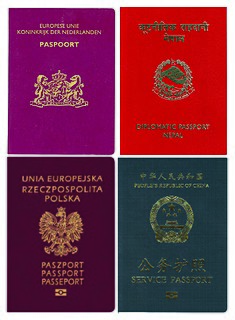
A passport is a travel document, usually issued by a country's government to its citizens, that certifies the identity and nationality of its holder primarily for the purpose of international travel. Standard passports may contain information such as the holder's name, place and date of birth, photograph, signature, and other relevant identifying information.

The Peninsular War (1807–1814) is the military conflict fought by Spain and Portugal, assisted by Great Britain, against the invading and occupying forces of the First French Empire for control of the Iberian Peninsula during the Napoleonic Wars. In Spain, it is considered to overlap with the Spanish War of Independence. The war began when the French and Spanish armies invaded and occupied Portugal in 1807, transiting through Spain, and escalated in 1808 after Napoleonic France occupied Spain, previously its ally. Napoleon Bonaparte forced the abdications of Ferdinand VII and his father Charles IV and then installed his brother Joseph Bonaparte on the Spanish throne, also promulgating the Bayonne Constitution. Most Iberians rejected French rule and fought a bloody war to oust them. The war on the peninsula lasted until the Sixth Coalition defeated Napoleon in 1814, and is regarded as one of the first wars of national liberation, significant for the emergence of large-scale guerrilla warfare.

Border control is the measures taken by a state or a bloc of states to monitor its borders and regulate the movement of people, animals, and goods across the border.
This article lists expulsions, refugee crises and other forms of displacement that has affected Jews.
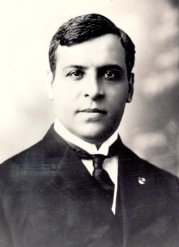
Aristides de Sousa Mendes do Amaral e Abranches GCC, OL was a Portuguese consul during World War II.

During World War I and World War II, Switzerland maintained armed neutrality, and was not invaded by its neighbors. Consequently, it was of considerable interest to belligerent states as the scene for diplomacy, espionage, and commerce, as well as being a safe haven for refugees.
Each "article" in this category is in fact a collection of entries about several stamp issuers, presented in alphabetical order. The entries themselves are formulated on the micro model and so provide summary information about all known issuers.

Allied-occupied Germany was the state of Germany upon defeat of Nazi Germany in World War II, when the victorious Allies asserted joint authority and sovereignty over Germany as a whole, defined as all territories of the former German Reich west of the Oder–Neisse line, having declared the destruction of Nazi Germany at the death of Adolf Hitler. The four powers divided "Germany as a whole" into four occupation zones for administrative purposes under the United States, United Kingdom, France and the Soviet Union, respectively. This division was ratified at the Potsdam Conference. The four zones were as agreed in February 1945 by the United States, United Kingdom and Soviet Union meeting at the Yalta Conference; setting aside an earlier division into three zones proposed by the London Protocol.
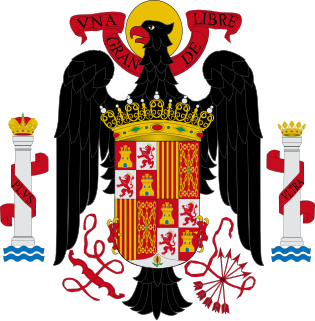
During World War II the Spanish State under Francisco Franco espoused neutrality as its official wartime policy. This neutrality wavered at times and "strict neutrality" gave way to "non-belligerence" after the Fall of France in June 1940. Franco wrote to Adolf Hitler offering to join the war on 19 June 1940. Later the same year Franco met with Hitler in Hendaye to discuss Spain's possible accession to the Axis Powers. The meeting went nowhere, but Franco would help the Axis — whose members Italy and Germany had supported him during the Spanish Civil War — in various ways.

Postal censorship is the inspection or examination of mail, most often by governments. It can include opening, reading and total or selective obliteration of letters and their contents, as well as covers, postcards, parcels and other postal packets. Postal censorship takes place primarily but not exclusively during wartime and periods of unrest, and occasionally at other times, such as periods of civil disorder or of a state of emergency. Both covert and overt postal censorship have occurred.
The World Passport is a fantasy travel document sold by the World Service Authority, a non-profit organization founded by Garry Davis in 1954.

In the decades since the Holocaust, some national governments, international bodies and world leaders have been criticized for their failure to take appropriate action to save the millions of European Jews, Roma, and other victims of the Holocaust. Critics say that such intervention, particularly by the Allied governments, might have saved substantial numbers of people and could have been accomplished without the diversion of significant resources from the war effort.
At the start of World War II in 1939, the Portuguese Government announced on 1 September that the 550-year-old Anglo-Portuguese Alliance remained intact, but since the British did not seek Portuguese assistance, Portugal was free to remain neutral in the war and would do so. In an aide-mémoire of 5 September 1939, the British Government confirmed the understanding. As Adolf Hitler's occupation swept across Europe, neutral Portugal became one of Europe's last escape routes. Portugal was able to maintain its neutrality until 1944, when a military agreement was signed to give the United States permission to establish a military base in Santa Maria in Azores and thus its status changed to non-belligerent in favor of the Allies.
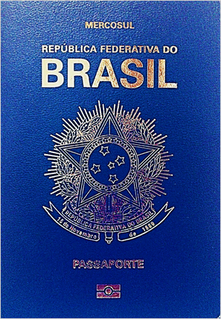
The Brazilian passport is the official document for foreign travel issued by the federal government, through the Federal Police.

New Zealand Red Cross or Ripeka Whero Aotearoa is a humanitarian organisation, which has more than 15,000 members and volunteers. In 2015, New Zealand Red Cross is celebrating its ‘Century of Care’ – 100 years of Red Cross activity in New Zealand. In New Zealand, Red Cross delivers core community services, such as Meals on Wheels, Community Transport, Refugee Services, first aid courses and emergency management operations. Internationally, New Zealand Red Cross sends aid workers overseas to assist in areas where humanitarian assistance is needed; this includes disaster preparedness and response. In 2013, 17 workers were sent to the Philippines in the aftermath of Typhoon Haiyan and in 2014, 18 New Zealand aid workers responded to the Ebola epidemic in West Africa.

The Schengen Area is an area comprising 26 European countries that have officially abolished all passport and all other types of border control at their mutual borders. The area mostly functions as a single jurisdiction for international travel purposes, with a common visa policy. The area is named after the 1985 Schengen Agreement signed in Schengen, Luxembourg.
Pedro Teotónio Pereira was a Portuguese politician and diplomat. He played a decisive role for the Allies, in drawing Spain with Portugal into a neutral peninsular bloc during World War II.
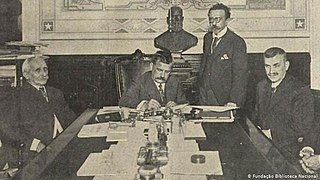
During World War I (1914–1918), Brazil initially adopted a neutral position, in accordance with the Hague Convention, in an attempt to maintain the markets for its export products, mainly coffee, latex and industrial manufactured items. However, following repeated sinking of Brazilian merchant ships by German submarines, President Venceslau Brás declared war against the Central Powers in 1917. Brazil was the only country in Latin America to be directly involved in the war. The major participation was the Brazilian Navy's patrol of areas of the Atlantic Ocean.

Red Cross parcel refers to packages containing mostly food, tobacco and personal hygiene items sent by the International Association of the Red Cross to prisoners of war during the First and Second World Wars, as well as at other times. It can also refer to medical parcels and so-called "release parcels" provided during World War II. The Red Cross arranged them in accordance with the provisions of the Geneva Convention of 1929. During World War II these packages augmented the often-meager and deficient diets in the PoW camps, contributing greatly to prisoner survival and an increase in morale. Modern Red Cross food parcels provide basic food and sanitary needs for persons affected by natural disasters, wars, political upheavals or similar events.

The Japan Re-entry Permit (再入国許可書), is a travel document similar to a certificate of identity, issued by Japan's Ministry of Justice. It is a passport-like booklet with a light brown cover with the words "再入国許可書 RE-ENTRY PERMIT TO JAPAN" on the front.
















